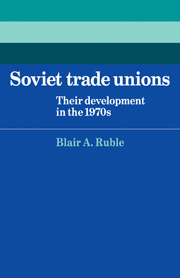Book contents
- Frontmatter
- Contents
- List of tables and figures
- Acknowledgments
- Abbreviations
- Introduction
- 1 Soviet trade union development: 1917–1956
- 2 Soviet trade union development: 1957–1980
- 3 Union–management–Party relations at the plant
- 4 The legal and social rights of Soviet workers
- 5 Do workers participate in Soviet management?
- 6 Patterns of union behavior
- 7 The international activities of Soviet trade unions
- Conclusion
- Notes
- Classified bibliography
- Index
2 - Soviet trade union development: 1957–1980
Published online by Cambridge University Press: 07 October 2011
- Frontmatter
- Contents
- List of tables and figures
- Acknowledgments
- Abbreviations
- Introduction
- 1 Soviet trade union development: 1917–1956
- 2 Soviet trade union development: 1957–1980
- 3 Union–management–Party relations at the plant
- 4 The legal and social rights of Soviet workers
- 5 Do workers participate in Soviet management?
- 6 Patterns of union behavior
- 7 The international activities of Soviet trade unions
- Conclusion
- Notes
- Classified bibliography
- Index
Summary
Not everyone welcomed the reemergence of Soviet unions during the 1950s, and the viewpoints in favor of increased union responsibilities did not gain immediate acceptance. Union revitalization remained merely one of several political, social, and economic issues to emerge following I. V. Stalin's death. Indeed, since Communist Party support for union reform did not appear certain until after N. S. Khrushchev had gained control of the Central Committee, there could well have been a link between the two events. Although definitive statements about the interrelationship between Khrushchev's rise to power and union revitalization require more substantial documentation than is currently available, one can argue vigorously that the events surrounding Khrushchev's defeat of the so-called Anti- Party Group played an important role in the further development of the unions.
Even though Party First Secretary Khrushchev had emerged as first among equals at the Twentieth Party Congress in February 1956, more than half of his fellow Presidium members turned against him sixteen months later. This unstable situation in the Soviet Union's most powerful political council provided an otherwise rare opportunity for politically weak institutions such as the trade unions to exert influence over the policymaking process. The AUCCTU, now chaired by Khrushchev protege V. V. Grishin, took fullest advantage of this opportunity by forestalling Party-supported union reorganization and by gaining Party backing for union-initiated reform efforts.
In December 1956, the Communist Party's Central Committee backed proposals made by Khrushchev's opponents to increase the authority of the State Economic Commission.
- Type
- Chapter
- Information
- Soviet Trade UnionsTheir Development in the 1970s, pp. 27 - 44Publisher: Cambridge University PressPrint publication year: 1981

